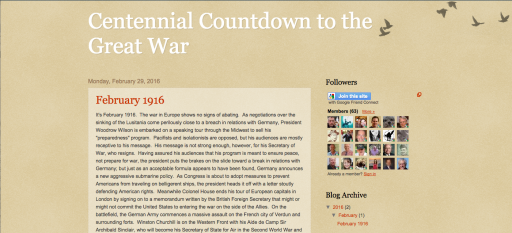On February 29th 2016, Dennis Cross published the latest instalment of his Centennial Countdown blog. Here’s his email summary of the posting:
‘It’s February 1916. The war in Europe shows no signs of abating. As negotiations over the sinking of the Lusitania come perilously close to a breach in relations with Germany, President Woodrow Wilson is embarked on a speaking tour through the Midwest to sell his “preparedness” program. Pacifists and isolationists are opposed, but his audiences are mostly receptive to his message. His message is not strong enough, however, for his Secretary of War, who resigns. Having assured his audiences that his program is meant to ensure peace, not prepare for war, the president puts the brakes on the slide toward a break in relations with Germany; but just as an acceptable formula appears to have been found, Germany announces a new aggressive submarine policy. As Congress is about to adopt measures to prevent Americans from traveling on belligerent ships, the president heads it off with a letter stoutly defending American rights. Meanwhile Colonel House ends his tour of European capitals in London by signing on to a memorandum written by the British Foreign Secretary that might or might not commit the United States to entering the war on the side of the Allies. On the battlefield, the German Army commences a massive assault on the French city of Verdun and surrounding forts. Winston Churchill is on the Western Front with his Aide de Camp Sir Archibald Sinclair, who will become his Secretary of State for Air in the Second World War and later be elevated to the peerage as Viscount Thurso. (After the 1999 House of Lords reforms, Lord Thurso’s grandson, the third viscount, will become the first peer to be elected to the House of Commons.) In Ottawa the Canadian Parliament building is destroyed by fire. In this presidential election year in the United States, no one has announced his (or her) candidacy for the office, but President Wilson gives permission for the use of his name in the Ohio Democratic primary. His eventual opponent, Supreme Court Justice Charles Evans Hughes, writes a letter opposing any use of his name in connection with the nominating process’.
